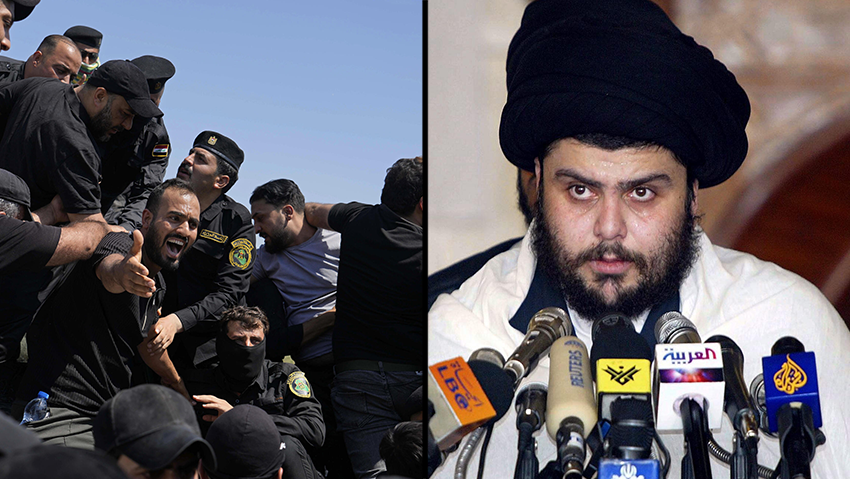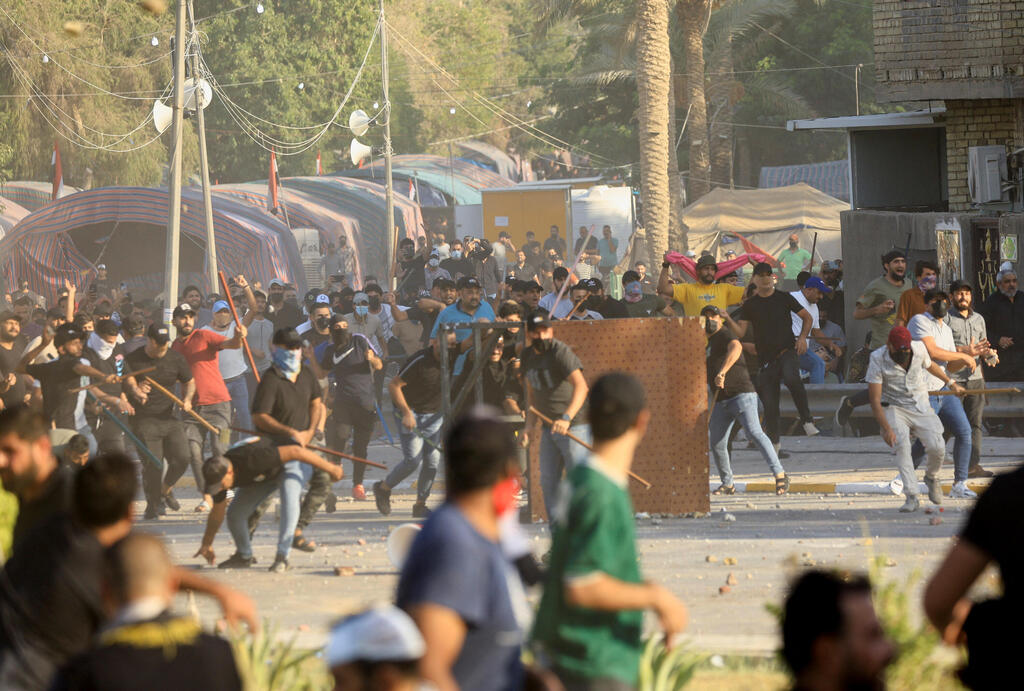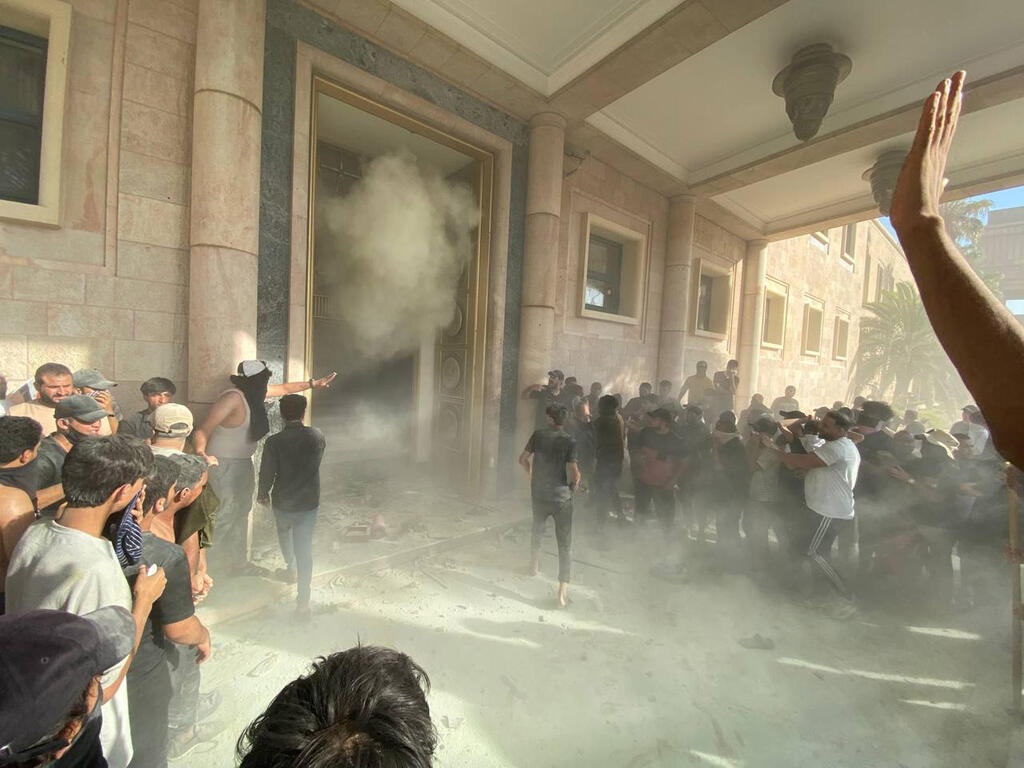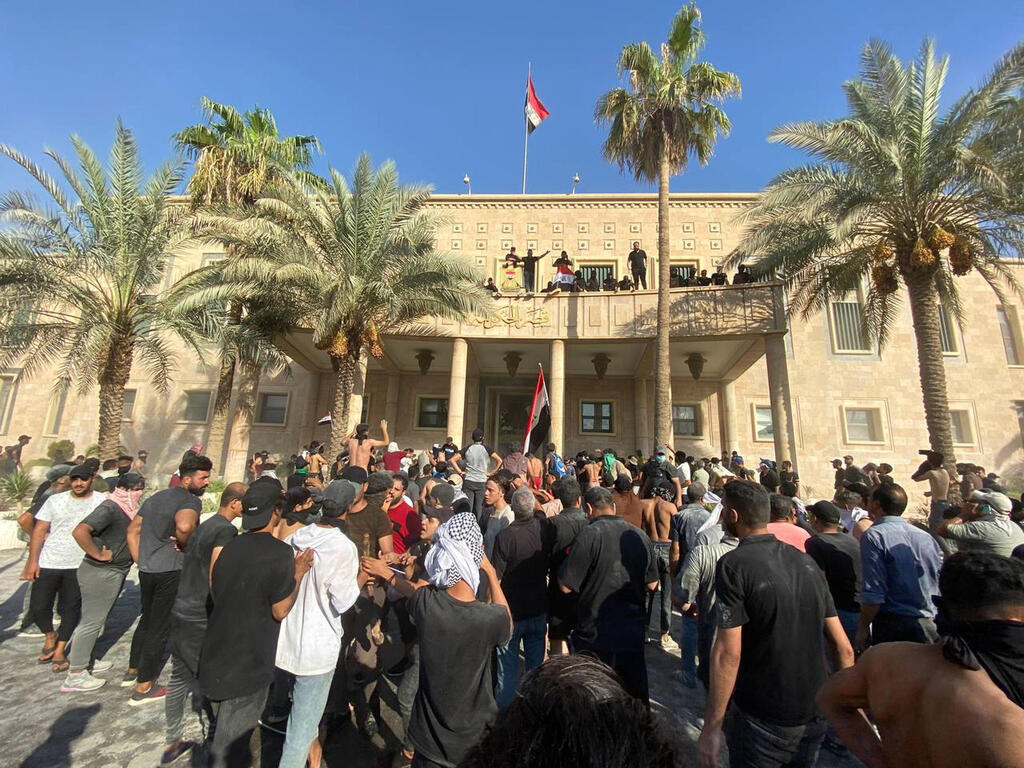An influential Shiite cleric announced Monday he would resign from Iraqi politics, prompting hundreds of his angry followers to storm the government palace and sparking clashes with security forces in which at least five protesters were killed.
Protesters loyal to cleric Muqtada al-Sadr pulled down the cement barriers outside the government palace with ropes and breached the palace gates. Many rushed into the lavish salons and marbled halls of the palace, a key meeting place for Iraqi heads of state and foreign dignitaries.
4 View gallery


Shiite cleric Muqtada al-Sadr and his supporters storming government palace
(Photo: AP, EPA)
Iraq's military announced a nationwide curfew and the caretaker premier suspended Cabinet sessions in response to the violence. Medical officials said at least 15 protesters were wounded by gunfire and a dozen more were injured by tear gas and physical altercations with riot police.
Iraq's government has been deadlocked since al-Sadrג's party won the largest share of seats in the October parliamentary elections but not enough to secure a majority government. His refusal to negotiate with his Iran-backed Shiite rivals and subsequent exit from the talks has catapulted the country into political uncertainty and volatility amid intensifying intra-Shiite wrangling.
To further his political interests al-Sadr has wrapped his rhetoric with a nationalist and reform agenda that resonates powerfully among his broad grassroots base who hail from Iraq's poorest sectors of society and have historically been shut out from the political system. They are calling for the dissolution of parliament and early elections without the participation of Iran-backed groups, which they see as responsible for the status quo.
An Associated Press photographer heard gunshots being fired in the capital and saw several protesters bleeding and being carried away. A senior medical official confirmed at least five protesters were killed by gunfire.
4 View gallery


Muqtada al-Sadr supporters clash with pro-Iranian groups, in Baghdad, Iraq
(Photo: Reuters)
Protests also broke out in the Shiite-majority southern provinces with al-Sadr's supporters burning tires and blocking roads in the oil-rich province of Basra and hundreds demonstrating outside the governorate building in Missan.
Iran considers intra-Shiite disharmony as a threat to its influence in Iraq and has repeatedly attempted to broker dialogue with al-Sadr.
In July, Al-Sadr's supporters broke into the parliament to deter his rivals in the Coordination Framework, an alliance of mostly Iran-aligned Shiite parties, from forming a government. Hundreds have been staging a sit-in outside the building for over four weeks. His bloc has also resigned from parliament. The Framework is led by al-Sadr's chief nemesis, former Prime Minister Nouri al-Maliki.
This is not the first time al-Sadr, who has called for early elections and the dissolution of parliament, has announced his retirement from politics — and many dismissed the latest move as another bluff to gain greater leverage against his rivals amid a worsening stalemate. The cleric has used the tactic on previous occasions when political developments did not go his way.
But many are concerned that it's a risky gambit and are worried about how it will impact Iraq's fragile political climate. By stepping out of the political process, al-Sadr is giving his followers, the most disenfranchised from the political system, the green light to act as they see fit.
Al-Sadr derives his political power from a large grassroots following, but he also commands a militia. He also maintains a great degree of influence within Iraq's state institutions through the appointments of key civil servant positions. His Iran-backed rivals also have militia groups.
Iraq's military swiftly announced a nationwide curfew beginning at 7pm It called on the cleric's supporters to withdraw immediately from the heavily fortified government zone and to practice self-restraint "to prevent clashes or the spilling of Iraqi blood," according to a statement.
"The security forces affirm their responsibility to protect government institutions, international missions, public and private properties," the statement said.
Iraq's caretaker Prime Minister Mustafa al-Kadhimi demanded that al-Sadr call on his followers to withdraw from government institutions. He also announced Cabinet meetings would be suspended.
The cleric announced his withdrawal from politics in a tweet, and ordered the closure of his party offices. Religious and cultural institutions will remain open.
The UN mission in Iraq said Monday's protests were an "extremely dangerous escalation," and called on demonstrators to vacate all government buildings to allow the caretaker government to continue running the state.
It urged all to remain peaceful and "refrain from acts that could lead to an unstoppable chain of events". "The very survival of the state is at stake," the statement said.
Al-Sadr's announcement on Monday appeared to be in part a reaction to the retirement of Shiite spiritual leader Ayatollah Kadhim al-Haeri, who counts many of al-Sadr's supporters as followers.
The previous day, al-Haeri announced he would be stepping down as a religious authority for health reasons and called on his followers to throw their allegiance behind Iran's Ayatollah Ali Khamenei, rather than the Shiite spiritual center in Iraq's holy city of Najaf.
The move was a blow to al-Sadr. In his statement, he said al-Haeri's stepping down "was not out of his own volition."



